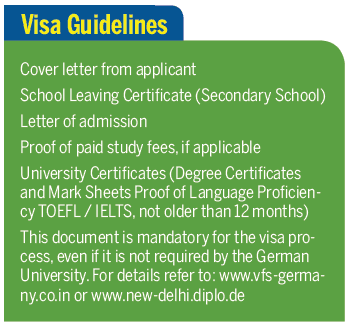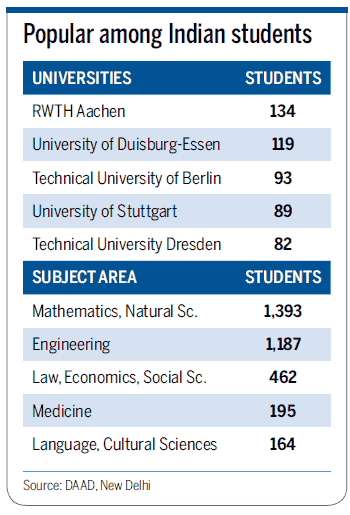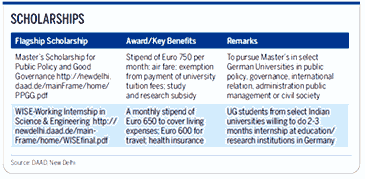
There are nearly 4,000 Indian students in Germany. Germany's strength in higher education has been in combining education with research at the bachelor's level. "In German education institutions both professors and students are involved in research right at the beginning of their course," says Christiane Schlottmann, director, DAAD, Delhi.
Only a few Indian institutions such as IIT and the Indian Institutes of Science Education and Research (IISER) at Pune follow this pattern. Right from school to master's level education, Indian students are usually told what to do by their teachers or their parents, observes Schlottmann. Thus students tend to depend more on teachers than they should, and self-study is limited to a few hours in the library.
Traditionally, German universities have been state-funded, and hence education has been free. It's only since the last three years that some universities have started charging 500 euros per semester as tuition fee.
Close links between industry and academia
Most of the German education institutions are heavily funded by industries. Another attractive feature of education in Germany is the active participation of small to medium enterprises in university research projects. Companies such as Siemens and Mercedes-Benz are involved in university research.
Mandatory internships
For science and engineering students, it is mandatory do to internships during vacation. "Industry experience is important,
in fact, now, in many universities internships for humanities too have been made compulsory." While students are expected to find internships opportunities on their own, the university supports them in their search.
Careers360 is a complete careers magazine.
 There are 300 international degree programmes that are entirely or partly taught in English. These courses are offered in various disciplines, especially in engineering, natural sciences, computer sciences and economics. There has been a growing interest in arts; however mathematics, engineering, biotechnology, renewable energy and ecology-related disciplines are among the popular courses.
There are 300 international degree programmes that are entirely or partly taught in English. These courses are offered in various disciplines, especially in engineering, natural sciences, computer sciences and economics. There has been a growing interest in arts; however mathematics, engineering, biotechnology, renewable energy and ecology-related disciplines are among the popular courses.
Though several master's and PhD programmes are being taught in English, universities are now introducing English as medium of instruction for a few bachelor's degree programmes, as well. But even then, Schlottmann says that it's always good to know a bit of the German language as it helps understand the culture of country.
Living in Germany
Germany is an expensive country. How high the cost of living is depends also on the city you decide to study in. Though
most universities do not charge any tuition fees, you should still contend with spending about 660 euro every month. However, that is the minimum and hence keep in mind that the expenses could go up to 700-750 euro. Students should carry prescriptions if they are on medication along with a basic first aid kit.
Health insurance is compulsory. German as well as foreign students are basically insured with a public health insurance company. It costs less than 50 euro.
Saving money
Each university town will have second-hand shops selling equipment, furniture, computers, etc. Many students like to go to the flea market (Flohmarket) where you can rummage around in boxes of books or records, haggle over the price of a cupboard or leather jacket. If you prefer to shop and barter from home, you can find small ads and auction portals on the internet as well.
 If you come from a country which is not a part of the European Union, such as India, you are allowed to work for only 90 days in a year. And then in certain Federal states, foreign students are allowed to work in the semester vacation. Basically, it isn't tough finding a job as a student, but students are advised not to work too many hours.
If you come from a country which is not a part of the European Union, such as India, you are allowed to work for only 90 days in a year. And then in certain Federal states, foreign students are allowed to work in the semester vacation. Basically, it isn't tough finding a job as a student, but students are advised not to work too many hours. Firstly, the visa. For students there are three types of visas: a language course visa, a study applicant's visa and the visa for study purposes or the student visa. Only the last one entitles you to a longer stay in Germany as a student.
Firstly, the visa. For students there are three types of visas: a language course visa, a study applicant's visa and the visa for study purposes or the student visa. Only the last one entitles you to a longer stay in Germany as a student.